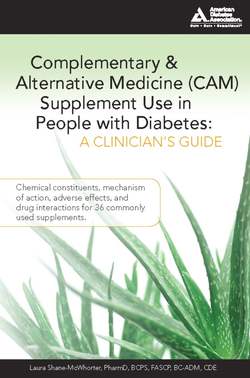Читать книгу Complementary and Alternative Medicine (CAM) Supplement Use in People with Diabetes: A Clinician's Guide - Laura Shane-McWhorter - Страница 11
На сайте Литреса книга снята с продажи.
EVALUATING CLAIMS FROM MANUFACTURERS OF DIETARY SUPPLEMENTS
ОглавлениеManufacturers may use deceptive marketing tactics to promote their products. Clinicians may wish to access the FDA website that provides suggestions on “How to Spot Health Fraud.”58 One caveat provided by the website is to be wary of a single product claiming benefit for a variety of unrelated diseases (for instance, difficulties ranging from menstrual problems to asthma to rheumatic complaints). Other caveats are to be wary of evidence of benefit based on personal testimonials, claims of unusually rapid benefit, or use of meaningless phrases that may sound scientifically impressive to lay consumers who do not have the education or training to determine veracity.
The FDA Center for Food Safety and Applied Nutrition has established two websites for consumers to evaluate information about dietary supplements. “Tips for the Savvy Supplement User”59 includes basic points to consider, such as talking with a health care provider before using a supplement, broaching the issue that some supplements may interact with prescription or over-the-counter medicines or have untoward effects during surgery. It also provides information on how to report adverse effects of dietary supplements. Furthermore, it provides tips on searching the Web for information on dietary supplements, such as how to find out who operates the site, the purpose of the site, the information sources and references, and whether the information is current. Another website, “Tips for Older Dietary Supplement Users,”60 discusses potential risks, such as the danger of substitution of dietary supplements for conventional medications or the dangers associated with consuming greater than recommended amounts. It also advocates discussion of dietary supplement use with the patient’s health care provider. It provides a checklist of important considerations such as issues with side effects, drug interactions, and possible discontinuation before scheduled surgery.
The following includes excerpts from The Health Professional’s Guide to Popular Dietary Supplements61 and provides other information that may help clinicians:
Nationally known companies generally have more stringent quality assurance and incorporate good manufacturing practices. Some companies may even import products tested in Europe. A list of these is included in The Complete German Commission E Monographs: Therapeutic Guide to Herbal Medicines.62
The following questions may elucidate useful information when contacting a manufacturer:61
Has the product been evaluated in clinical studies published in peer-reviewed journals? If so, is the company willing to share these studies?
Can the manufacturer explain the pharmacological mechanism? Is there research to support this mechanism?
Does the company complete an analysis of the active as well as inert ingredients?
Does the company complete an analysis of the final product to insure that package contents match the labeled information?
Does the product meet bioavailability standards for disintegration dissolution?
What are the storage or stability precautions?
What are listed contraindications for product use?
